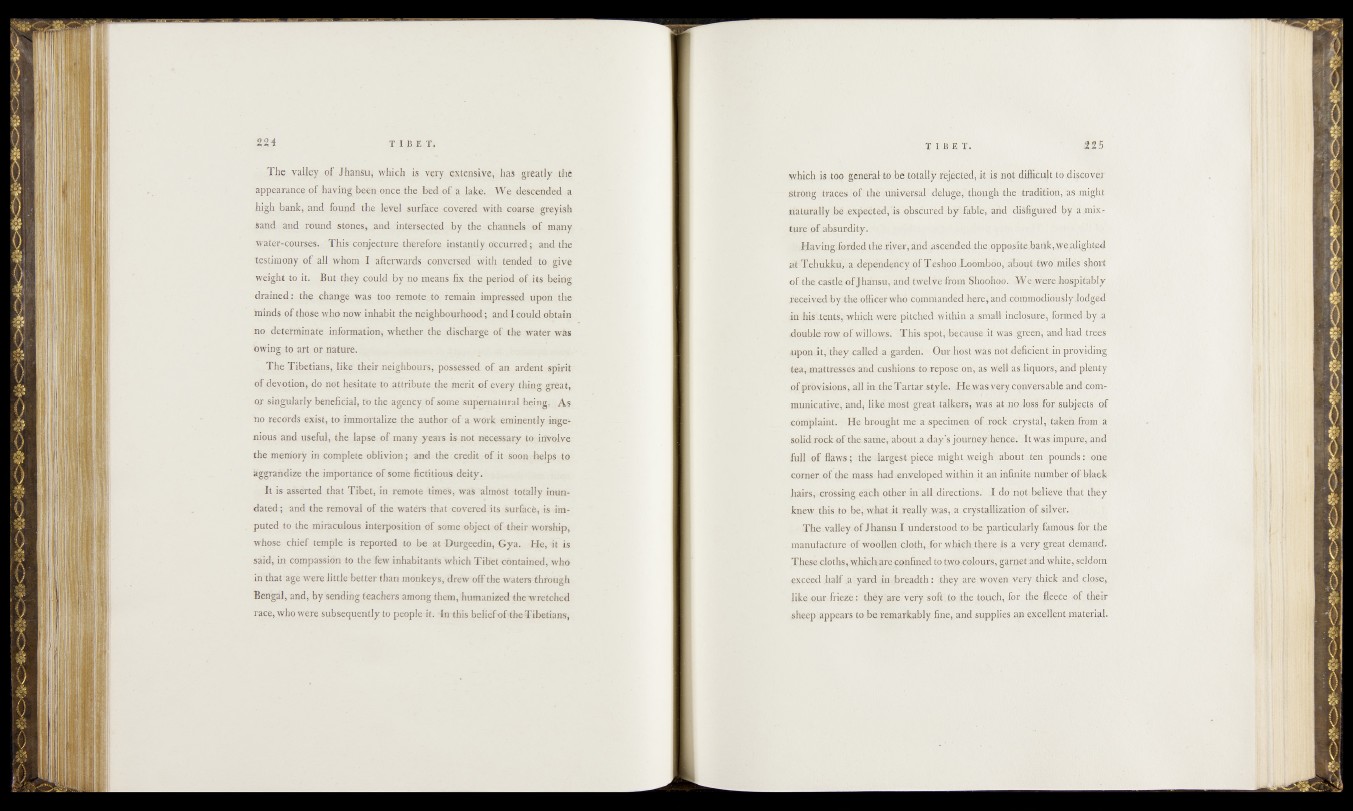
2.24 T IBE T ;
The vaile^df Jhansu* which is very f&ttflasiVfti has greatly, the
appearance of having heed once the bed of a lake. We descended a
high bank, and found the level surface covered with coarse greyish
San'd and round stones* and. intersected by the channels of niany
water-courses. This conjecture therefore instantly occurred; and the
testimony of all whom I afterwards conversed with tended to, give
weight to it. But they could by no means fix the period of its being
drained: the change was too remote to remain impressed upon the
ininds of those who now inhabit the neighbourhood; and I could Obtain
no dcterrtdnate information* whether the discharge of the water w£s
bwing to art or nature.
The Tibefians, like their neighbours, possessed of an ardent spirit
Of devotion, do net hesitate to attribute the merit pfevery thingjgiCat,
or singularly beneficial, to the agency of some supernatural being. As
no records exist, to immortalize the author of a work eminently ingenious
and useful, the lapse of many years is not necessary to involve
the memory in complete oblivion; and the credit of it soon helps to
aggrandize the importance of some fictitious deity. ;
It is asserted that Tibet, in remote times, was almost -totally inundated
: and the removal of the waters that -covered Its surfhefe, is imputed
to the miraculous interposition of some objectmftheir worship,
whose chief temple is reported to be at Durgeedin, Gya. He, it is
said, in compassion to the few inhabitants which Tibet contained, who
in that age were little better than monkeys, drewoffthe waters through
Bengal, and, by sending teachers among them, humanized thewretched
race, who were subsequently to people it. In this belieferfthe Tibetiarrs,
T I B;E X. 225
Which is ton general-to he" totally rejected, at askjiqt dlflienjt.t.0 difieover
jsicong traces !o£l .the./universal deluge,^ thopgh the tradition, as .might
rWtarally .be expected, is obsquteddiyffabfe) and disfigured by atiuxr.
time pf,absurdity.
: .Havingjforded dteiiver,.arid 3sce»ded«the,QppodieJmhk,Weighted
at Tehukkn,.-a dependencyx>f T.esbob Loomboo, ahoyLtwO-truies .short
ofethe castle,of.Jthansu,.and twelve from Shoohoo. iWe|$s^rehospitably
I&eeiveeLb'y.the.officer who demanded h||.re^and,oQmmadiQjkslydodged
in»his\tents, whiGhwere pitched withingaqsniai-l inelosure, foasnedrby5«
dQuhle’idw of willows. This spot i/Because-it was igrben, and had trees
upon..it, 'they called .a .garden. Qurijbskiwas not deficient ,in providing’
tea,..mattresses and cushions.to.repose on',.as wdU flsLliqunrs,ahcl plenty
p£p*hvisions, all inihe Tartar.style. JHe.waayery. conversable andicogir
mnriieatiye, and, like most great talkers, .was at no doss for streetsj of
complaint. He brought me a specimen' ,qT.rohk .firystag takehikam !a
solid, rock of the same, about a day ’s jnurheyihenee.. It, whs .impure, .and
full of flaws.; the largest, pjeeb might weig® about ..ten .'phtofls :,^pne
corner of the mass had .enveloped within, it an infinite number nfibteek-
hairs, cros sing each .pitber in all directions. J do not believe that ffiey
knew.this to be;;wJ®t it .really,was, a cnys^.llization,of.sil&,e4u- ,r
TheiValley of Jhansu.I undfirstood io/bfi partiadarlyJamdus ferjhe
manufacture of wodlfop;ddlhi..firwbieJk.thsrevjls a very great demand.
These cfoths, which. are«si?6ned to twoepfows, g irpe t a n d ^h itf; se J qlom
exceed .featf a yard wijbrfeadth: they .and^fo?^,,
like jOssT',frieze: thdyiaie very 'soft,fp the touch, for
sheep appears to be remarkably fibs,/and.supphes^i excellent material.